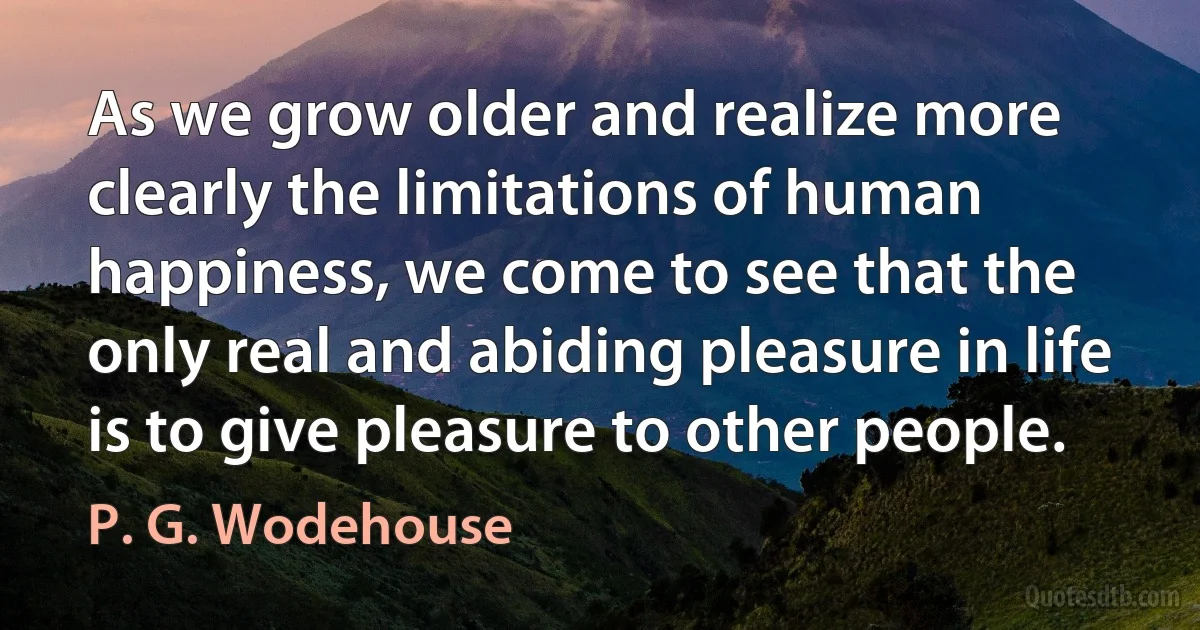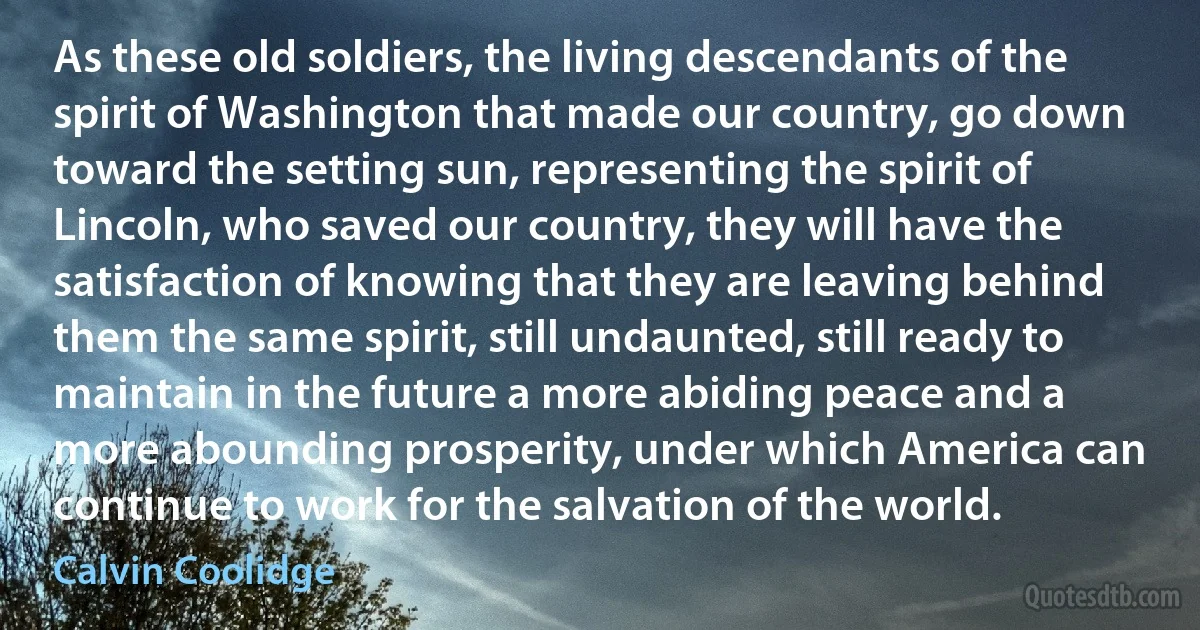Abiding Quotes - page 2
One thing we have endeavoured to observe most scrupulously, namely, never to depart from the strictest facts and, in dealing with the difficult questions that have arisen during the year, we hope that we have used the utmost moderation possible under the circumstances. Our duty is very simple and plain. We want to serve the community, and in our own humble way to serve the Empire. We believe in the righteousness of the cause, which it is our privilege to espouse. We have an abiding faith in the mercy of the Almighty God, and we have firm faith in the British Constitution. That being so, we should fail in our duty if we wrote anything with a view to hurt. Facts we would always place before our readers, whether they are palatable or not, and it is by placing them constantly before the public in their nakedness that the misunderstanding between the two communities in South Africa can be removed.

Mahatma Gandhi
Present excitement will at all times magnify present dangers, but true philosophy must teach us that none more threatening than the past can remain to be overcome; and we ought (for we have just reason) to entertain an abiding confidence in the stability of our institutions and an entire conviction that if administered in the true form, character, and spirit in which they were established they are abundantly adequate to preserve to us and our children the rich blessings already derived from them, to make our beloved land for a thousand generations that chosen spot where happiness springs from a perfect equality of political rights.

Martin Van Buren
When we speak of Empire, it is in no spirit of flag-wagging...we feel that in this great inheritance of ours, separated as it is by the seas, we have yet one home and one people...great as the material benefits are, we do not look primarily to them. I think deep down in all our hearts we look to the Empire as the means by which we may hope to see that increase of our race which we believe to be of such inestimable benefit to the world at large; the spread abroad of people to whom freedom and justice are as the breath of their nostrils, of people distinguished, as we would fain hope and believe, above all things, by an abiding sense of duty. If ever the day should come when an appeal to that sense of duty falls on deaf ears among our own kin, that day indeed would be the end of our country and of our Empire, to which you and I have dedicated our very lives.

Stanley Baldwin
It does not frighten me to leave this life that my only son left five years ago, this life that insists we bear sorrow upon sorrow long after we can bear no more. No, I believe I shall gladly take my leave when the time comes. What frightens me, hamshira, is the day God summons me before him and asks, Why did you not do as I said, Mullah? Why did you not obey my laws? How shall I explain myself to him, hamshira? What will be my defense for not heeding His commands? All I can do, all any of us can do, in the time we are granted, is to go on abiding by the laws He has set for us. The clearer I see my end, hamsira, the nearer I am to my day of reckoning, the more determined I grow to carry out His word. However painful it may prove.

Khaled Hosseini
Let us therefore join hands, Britons, Burmans and all nations alike, to build up an abiding fruitful peace over the foundations of the hard-won victory that all of us desiring progressive direction in our own affairs and in the world at large, have at long last snatched firmly and completely from the grabbing hands of Fascist barbarians, a peace, as I have said, not of the graveyard, but creative of freedom, progress and prosperity in the world.

Aung San
Out security agencies work with each other and with others around the globe to track people who are threats to Canada and to watch threats that may evolve. I think though, this is not a time to commit sociology, if I can use an expression. It's time to treat this- these things are serious threats. Global terrorist attacks, people who have agendas of violence-deep and abiding threats to all the values that our society stands for.

Stephen Harper
I have discovered a goodness and decency in people as exhibited in all the letters, e-mails, flowers, gifts and prayers that have been directed my way. I am overwhelmed and humbled. I offer you my most sincere thanks and my deep and abiding gratitude. If I ever write my memoirs, I have some spellbinding material. How does the Joni Mitchell song go? "Don't it always seem to go that you don't know what you've got till it's gone"? One thing I've discovered is that I love my job more than I thought I did, and I love my wife even more!

Roger Ebert
She says the solution is to ban guns. They tried that in France which has among the toughest gun laws anywhere in the world, and 130 people were brutally murdered by Islamic terrorists in cold blood. Her plan is to disarm law abiding Americans, abolishing the Second Amendment, and leaving only the bad guys and terrorists with guns. No good. Not going to happen, folks. ... She wants to take away American's guns and then admit the very people who want to slaughter us. Let them come into the country, we don't have guns. Let them come in, let them have all the fun they want.

Donald Trump
In this word: Suddenly thou shalt be taken, - I saw that God rewardeth man for the patience that he hath in abiding God's will, and for his time, and that man lengtheneth his patience over the time of his living. For not-knowing of his time of passing, that is a great profit: for if a man knew his time, he should not have patience over that time; but, as God willeth, while the soul is in the body it seemeth to itself that it is ever at the point to be taken. For all this life and this languor that we have here is but a point, and when we are taken suddenly out of pain into bliss then pain shall be nought.

Julian of Norwich
It is God's will that we take His behests and His comfortings as largely and as mightily as we may take them, and also He willeth that we take our abiding and our troubles as lightly as we may take them, and set them at nought. For the more lightly we take them, and the less price we set on them, for love, the less pain we shall have in the feeling of them, and the more thanks and meed we shall have for them.

Julian of Norwich
Dear young people, we have seen that it is the Holy Spirit who brings about the wonderful communion of believers in Jesus Christ. True to his nature as giver and gift alike, he is even now working through you. Let unifying love be your measure; abiding love your challenge; self-giving love your mission!

Pope Benedict XVI
In no nation are the institutions of progress more advanced. In no nation are the fruits of accomplishment more secure. In no nation is the government more worthy of respect. No country is more loved by its people. I have an abiding faith in their capacity, integrity and high purpose. I have no fears for the future of our country. It is bright with hope.

Herbert Hoover
We had to dispel the notion that the way to economic success lies through a sort of fiscal levitation. That was the abiding post-war delusion-that governments could spend and borrow their way to prosperity, and fine-tune the performance of the economy through something known pretentiously as demand management...It used to be an establishment nostrum that you need a budget deficit to get economic growth. That was the belief which lay behind the notorious letter by 364 economists in March 1981. We have given the lie to that, decisively. There can no longer be any argument about it. Everyone-or almost everyone-now accepts that the proper role of macro-economic policy is to keep downward pressure on inflation and to maintain a stable framework in which the private sector can expand.

Nigel Lawson
Spinoza, then, emerged as the supreme philosophical bogeyman of Early Enlightenment Europe. Admittedly, historians have rarely emphasized this. It has been much more common, and still is, to claim that Spinoza was rarely understood and had very little influence, a typical example of an abiding historiographical refrain which appears to be totally untrue but nevertheless, since the nineteenth century, has exerted an enduring appeal for all manner of scholars. In fact, no one else during the century 1650–1750 remotely rivalled Spinoza's notoriety as the chief challenger of the fundamentals of revealed religion, received ideas, tradition, morality, and what was everywhere regarded, in absolutist and non-absolutist states alike, as divinely constituted political authority.

Baruch Spinoza
The time to stop those who would loosen and weaken the fabric of our government is before they begin. The time for Americans to range themselves firmly, squarely and uncompromisingly behind American ideals is now. The great body of our people have an abiding faith in their own country. The time has come when they should supplement that faith with action. The question is whether America will allow itself to be degraded into a communistic and socialistic state, or whether it will remain American. Those who want to continue to enjoy the high estate of American citizenship will resist all attempts to encroach upon their liberties by encroachment upon the power of the courts.

Calvin Coolidge
There is no other foundation on which freedom has ever found a permanent abiding place. We shall have to make our decision whether we wish to maintain our present institutions, or whether we wish to exchange them for something else. If we permit some one to come to support us, we can not prevent some one coming to govern us. If we are too weak to take charge of our own mortality, we shall not be strong enough to take charge of our own liberty. If we can not govern ourselves, if we can not observe the law, nothing remains but to have some one else govern us, to have the law enforced against us, and to step down from the honorable abiding place of freedom to the ignominious abode of servitude.

Calvin Coolidge



